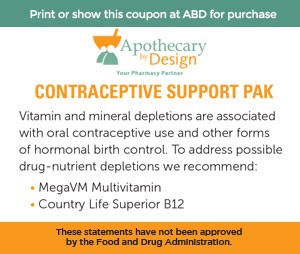Oral contraceptives (OCPs), also known as Birth Control Pills or “The Pill” are a class of medication commonly used to prevent pregnancy. They may also be used for the treatment of acne, premenstrual dysphoric disorder, or a number of conditions characterized by excessive menstrual bleeding and/or pain. There are many variations of oral contraceptive pills. Many brands are available, each prescribed based upon their relative hormone activities.
Mechanism of Action: Oral contraceptives may be a combination of estrogen with synthetic progesterone called progestin, or just progestin alone. All forms of OCP prevent pregnancy by preventing ovulation, changing the uterine lining to be inhospitable to implantation, and inhibiting sperm entry to the female reproductive tract by thickening the cervical fluids.
Multiple nutrient deficiencies associated with OCP have been identified since 1975. Serum nutrient changes were noticed within the first few cycles of oral contraceptive treatment. These nutrient depletions also apply to the hormone based contraceptive vaginal ring and IUD, and may also apply to menopausal hormone replacement therapies.
| Vitamin/ Nutrient | Mechanism of depletion | Suggested Action |
| Vitamin B2 | Although the biochemical mechanism has not been identified, a fall in vitamin B2 (riboflavin) levels has consistently been associated with OCP use. | Supplement with all B vitamins as interrelationships create synergistic effect. Exercise increases requirements. |
| Vitamin B6 | Elevated estrogen and progestins alter the metabolism and function of Vitamin B6. OCPs impair an enzymatic pathway to serotonin production. Elevating B6 levels corrects this. Some OCP with higher estrogen levels also bind with insulin through a complex biochemical pathway, impairing glucose tolerance. This is also corrected through coadministration of vitamin B6. | Supplement with vitamin B6 daily. Suggested dose is minimum 20mg twice per day. More than 100mg B6 daily is not recommended for long term use. |
| Vitamin B12 | Decades of evidence indicate that OCPs cause a biochemical deficiency of vitamin B12. Vitamin B12 is essential in the metabolism of homocysteine; deficiency may compound the cardiovascular risk associated with estrogen therapy. | 1000 – 5000 mcg supplementation is suggested. Vitamin B12 is best absorbed as a sublingual lozenge or intramuscular (IM) injection. |
| Vitamin E | Decreased plasma Vitamin E levels are associated with OCP use. Platelet clotting hyperactivity is associated with decreased vitamin E and with OCP. | 400IU mixed tocopherol vitamin E daily. This is best taken with Vitamin C for superior antioxidant action. |
| Folic Acid | It has been well established that OCP, especially brands with higher estrogen levels, impair folate metabolism and tend to deplete folic acid. | Co-administer 400-800 mcg folic acid daily with Vitamins B6 & B12, especially when stopping OCP’s with the intention of becoming pregnant. |
| Magnesium | Additional estrogen in OCPs deplete the body’s stores of magnesium by increasing the uptake and utilization from soft tissue and bone. | Supplementation with 250-350 mg daily protects against estrogen induced magnesium deficiency. |
| Selenium | OCP use is associated with decreased selenium blood levels. As selenium is also required for conversion of thyroid hormones as well as breast cancer prevention, supplementation may be indicated as a preventative measure. | Supplementation with 100 micrograms daily, or increase foods rich in selenium. (This mineral has been depleted from many soils and may be hard to obtain from food.) |
| S-Adenosyl-methionine (SAMe) | Estrogen’s role in liver dysfunction, gall bladder disease and weight gain may be due to the associated cholesterol saturation of bile. Evidence suggests oral SAMe may counter these adverse hepatobiliary and fat metabolism issues. | 400 – 800mg daily |
To avoid drug/nutrient depletions, the ideal dietary supplement should contain a B complex together with folic acid, vitamins E and C, as well as minerals such as magnesium, selenium and zinc. To meet these nutrient requirements, we recommend MegaVM multivitamin by Intensive Nutrition, with additional Vitamins B12 and magnesium. SAMe may be used as needed.
Ask our pharmacist or wellness specialists if:
- You have concerns about mineral/vitamin deficiency.
- You would like more information about choosing an appropriate supplement.
 References:
References:
1. “Estrogen and Progestin’s (Oral Contraceptives).” Medline Plus. National Institute of Health , July 2012. http://www.nlm.nih.gov Accessed 10/02/2014
2. “Birth Control Pills (Oral Contraceptives).” Melissa Conrad Stoppler MD. Medicine Net. n.p., n.d. http://www.medicinenet.com Accessed 10/02/2014
3. Nutrient Depletion: Oral Contraceptives.” Natural Medicines.n.p. 2015. https://naturalmedicines-therapeuticresearch-com.une.idm.oclc.org Accessed 09/25/2014
4. Ahmed F, Bamji, Lyengar L. “ Effect of oral contraceptive agents on vitamin nutrition status.” Am J Clin Nutr. 28.6. (1975):606-15. http://www.ncbi.nlm.nih.gov Accessed 09/25/2014
5. Palmery M, Saraceno A, Vaiarelli A, Carlomagno. “ Oral contraceptives and changes in nutritional requirements.” Eur Rev Med Pharmacol Sci. 17.13(2013):1804 – 13 http://www.ncbi.nlm.nih.gov/pubmed/23852908 Accessed 10/19/14
6. Stargrove M, Treasure J, McKee D. Herb, Nutrient and Drug Interactions. Mosby Elsevier Publishing, Missouri p. 222 – 224, 260, 274, 327-328, 351, 569-570, 615, 828.

